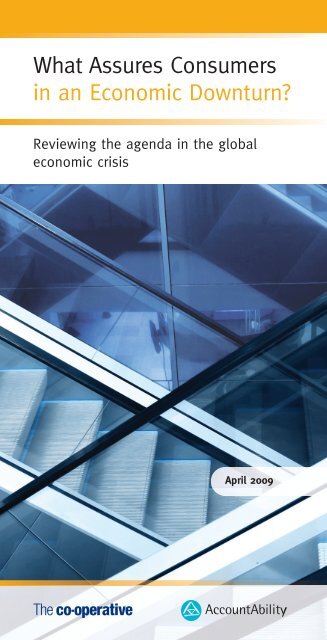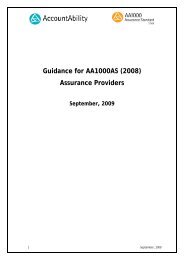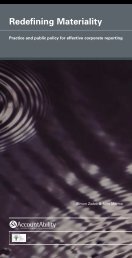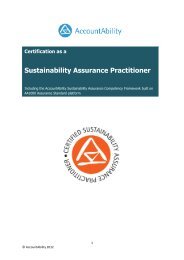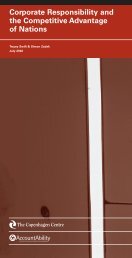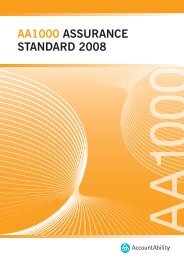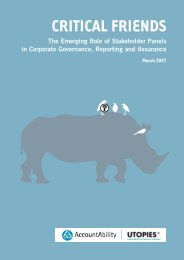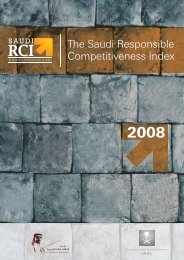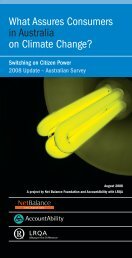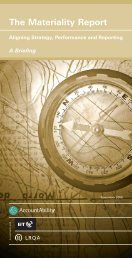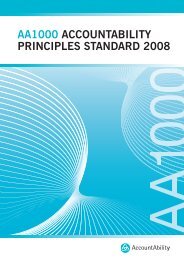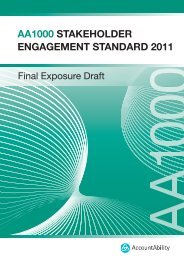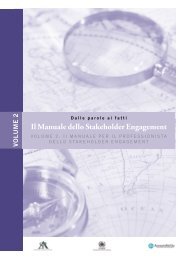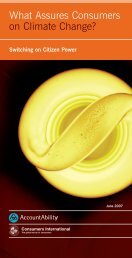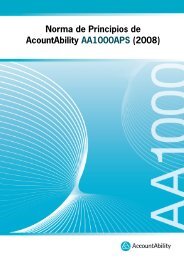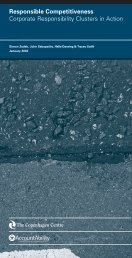What Assures Consumers in an Economic Downturn? - AccountAbility
What Assures Consumers in an Economic Downturn? - AccountAbility
What Assures Consumers in an Economic Downturn? - AccountAbility
You also want an ePaper? Increase the reach of your titles
YUMPU automatically turns print PDFs into web optimized ePapers that Google loves.
<strong>What</strong> <strong>Assures</strong> <strong>Consumers</strong><br />
<strong>in</strong> <strong>an</strong> <strong>Economic</strong> <strong>Downturn</strong>?<br />
Review<strong>in</strong>g the agenda <strong>in</strong> the global<br />
economic crisis<br />
April 2009
<strong>AccountAbility</strong>’s Assur<strong>an</strong>ce for Ch<strong>an</strong>ge program publicised with<strong>in</strong> the <strong>What</strong> <strong>Assures</strong>?<br />
research <strong>an</strong>d report series explores <strong>an</strong>d adv<strong>an</strong>ces <strong>in</strong>novative approaches to build<strong>in</strong>g<br />
credible assur<strong>an</strong>ce. While approach<strong>in</strong>g this question from a r<strong>an</strong>ge of different <strong>an</strong>gles,<br />
<strong>What</strong> <strong>Assures</strong> <strong>Consumers</strong>? forms part of this series, explor<strong>in</strong>g citizens’ potential as<br />
ch<strong>an</strong>ge-makers through their own consumption choices. The research series is rooted<br />
<strong>in</strong> <strong>AccountAbility</strong>’s AA1000 Series <strong>an</strong>d related st<strong>an</strong>dards work as well as the research<br />
<strong>an</strong>d work on Materiality.<br />
<strong>What</strong> <strong>Assures</strong>? written by <strong>AccountAbility</strong> <strong>an</strong>d sponsored by<br />
PricewaterhouseCoopers LLP <strong>in</strong> 2006, makes the case that<br />
assur<strong>in</strong>g stakeholders that your org<strong>an</strong>isation is deliver<strong>in</strong>g on its<br />
commitments will be multi-faceted <strong>in</strong> the 21st Century. It will<br />
<strong>in</strong>volve cont<strong>in</strong>uous engagement with a r<strong>an</strong>ge of stakeholders<br />
concerned with both past <strong>an</strong>d future perform<strong>an</strong>ce.<br />
The first phase of <strong>What</strong> <strong>Assures</strong> <strong>Consumers</strong>? undertaken by<br />
<strong>AccountAbility</strong> <strong>in</strong> partnership with the National Consumer Council<br />
dur<strong>in</strong>g 2006 aimed to better underst<strong>an</strong>d what assures the public<br />
<strong>in</strong> their decision-mak<strong>in</strong>g on purchases to build practices that<br />
both empower consumers but also strengthen corporate<br />
perform<strong>an</strong>ce.<br />
<strong>What</strong> <strong>Assures</strong> <strong>Consumers</strong> on Climate Ch<strong>an</strong>ge? produced by<br />
<strong>AccountAbility</strong> <strong>in</strong> partnership with <strong>Consumers</strong> International <strong>in</strong><br />
2007 follows on from the first phase of <strong>What</strong> <strong>Assures</strong><br />
<strong>Consumers</strong>? with the aim of underst<strong>an</strong>d<strong>in</strong>g what role consumers<br />
c<strong>an</strong> play <strong>in</strong> overcom<strong>in</strong>g the global obstacles to avert<strong>in</strong>g<br />
catastrophic climate ch<strong>an</strong>ge.<br />
Written by <strong>AccountAbility</strong> <strong>in</strong> partnership with Net Bal<strong>an</strong>ce<br />
Foundation <strong>in</strong> 2008, <strong>What</strong> <strong>Assures</strong> Australi<strong>an</strong> <strong>Consumers</strong> on<br />
Climate Ch<strong>an</strong>ge focuses on consumer awareness <strong>an</strong>d action on<br />
climate ch<strong>an</strong>ge <strong>in</strong> Australia <strong>an</strong>d aims to build underst<strong>an</strong>d<strong>in</strong>g of<br />
the role that consumers c<strong>an</strong> play to avert the climate ch<strong>an</strong>ge<br />
crisis. It looks at what <strong>in</strong>fluences consumer behaviour, what<br />
provides effective assur<strong>an</strong>ce <strong>an</strong>d what pathways offer the<br />
greatest opportunities for impact.<br />
To freely download the publications or for more <strong>in</strong>formation on the<br />
<strong>What</strong> <strong>Assures</strong>? series visit www.accountability21.net/whatassures
Contents<br />
Forewords ................................................................................................................4<br />
Executive Summary ..................................................................................................6<br />
Introduction: The economic downturn <strong>in</strong> the UK....................................................8<br />
The impact on consumer spend<strong>in</strong>g ......................................................................10<br />
Ch<strong>an</strong>g<strong>in</strong>g consumer op<strong>in</strong>ion ..................................................................................13<br />
Implications for bus<strong>in</strong>ess strategies......................................................................16<br />
A new phase of assur<strong>an</strong>ce? ..................................................................................21<br />
Recommendations ..................................................................................................24<br />
Footnotes ................................................................................................................26<br />
Acknowledgements ................................................................................................28<br />
<strong>What</strong> <strong>Assures</strong> <strong>Consumers</strong> <strong>in</strong> <strong>an</strong> <strong>Economic</strong> <strong>Downturn</strong>? 3
Forewords<br />
Forewords<br />
Barry Clav<strong>in</strong><br />
Contrary to what was predicted from certa<strong>in</strong> quarters, this research highlights that<br />
consumer attitudes to corporate responsibility have rema<strong>in</strong>ed fairly stable dur<strong>in</strong>g the<br />
early days of this downturn. Issues that mattered to consumers back <strong>in</strong> 2006 rema<strong>in</strong><br />
import<strong>an</strong>t today. In the ma<strong>in</strong>, consumers look to the bus<strong>in</strong>esses that they tr<strong>an</strong>sact<br />
with to treat people well, be it employees or supply cha<strong>in</strong> workers, <strong>an</strong>d to be honest<br />
<strong>an</strong>d tr<strong>an</strong>sparent <strong>in</strong> their deal<strong>in</strong>gs. <strong>What</strong>’s more, consumers are claim<strong>in</strong>g that, with one<br />
or two exceptions, their predisposition to purchase ‘ethically’ is not set to ch<strong>an</strong>ge<br />
signific<strong>an</strong>tly over the next six months.<br />
However, what does seem to have ch<strong>an</strong>ged is the trust shown to corporate<br />
bus<strong>in</strong>esses. Three years ago there was a will<strong>in</strong>gness from consumers to take commercial<br />
<strong>in</strong>formation more readily at face value so that trusted ch<strong>an</strong>nels of <strong>in</strong>formation<br />
<strong>in</strong>cluded <strong>in</strong>-store promotions <strong>an</strong>d on pack <strong>in</strong>formation. Today just four per cent of<br />
consumers claim to trust the PLC model despite more th<strong>an</strong> one <strong>in</strong> two consumers<br />
identify<strong>in</strong>g bus<strong>in</strong>esses as key to ensur<strong>in</strong>g responsible behaviour. It is not <strong>in</strong>signific<strong>an</strong>t<br />
to note that <strong>in</strong>dependent <strong>in</strong>formation sources are now the primary source of<br />
consumer assur<strong>an</strong>ce, <strong>in</strong> particular consumer watchdogs, <strong>an</strong>d to a lesser extent trusted<br />
third party accreditation bodies.<br />
So, after consumer watchdogs, <strong>an</strong>d alongside <strong>in</strong>dustry regulators, it is reward<strong>in</strong>g to<br />
see co-operatives identified as trusted org<strong>an</strong>isations. Our recent experience chimes<br />
with this research. Over the last twelve months or so, The Co-operative has consulted<br />
with over a quarter of a million of its member customers to <strong>in</strong>form its approach to<br />
susta<strong>in</strong>able development. This has <strong>in</strong>cluded its most successful consultation on The<br />
Co-operative B<strong>an</strong>k’s customer-led Ethical Policy <strong>an</strong>d has culm<strong>in</strong>ated <strong>in</strong> The Co-operative’s<br />
largest ever values-led advertis<strong>in</strong>g campaign. <strong>What</strong>’s more, current account<br />
open<strong>in</strong>gs at the B<strong>an</strong>k are up sixty five per cent <strong>an</strong>d <strong>an</strong>nual sales of our Fairtrade<br />
products have <strong>in</strong>creased by some forty four per cent.<br />
<strong>What</strong> consumers seem to be say<strong>in</strong>g to bus<strong>in</strong>ess is that if corporate responsibility<br />
mattered <strong>in</strong> good times then it should matter <strong>in</strong> tougher times. Bus<strong>in</strong>esses should,<br />
therefore, not th<strong>in</strong>k that they c<strong>an</strong> hope to rebuild consumer trust by turn<strong>in</strong>g on <strong>an</strong>d<br />
off the ‘corporate social responsibility’ tap. Indeed, when the economy turns around,<br />
consumers may well be hold<strong>in</strong>g such bus<strong>in</strong>esses to account <strong>an</strong>d ask<strong>in</strong>g: ‘So what did<br />
you do <strong>in</strong> the downturn?’<br />
Barry Clav<strong>in</strong><br />
Ethical Policies <strong>an</strong>d Susta<strong>in</strong>ability Report<strong>in</strong>g M<strong>an</strong>ager<br />
The Co-operative Group<br />
4
Ed Mayo<br />
We live <strong>in</strong> what commentators have called a ‘symbolic economy’, <strong>in</strong> which every<br />
product <strong>an</strong>d service takes on new me<strong>an</strong><strong>in</strong>gs, whether of freedom, identity, wellbe<strong>in</strong>g<br />
or security. When consumer magaz<strong>in</strong>es started life, decades ago, they listed<br />
products for their functional value rather th<strong>an</strong> their symbolism. I remember Which?<br />
magaz<strong>in</strong>e select<strong>in</strong>g a pair of je<strong>an</strong>s from the dowdy camp<strong>in</strong>g shop, Milletts, as their<br />
“best buy” – perfect if you pick your je<strong>an</strong>s by price but not quite right if it is the<br />
values of look <strong>an</strong>d fashion that count for shoppers.<br />
In this world of br<strong>an</strong>d, market<strong>in</strong>g, emotion <strong>an</strong>d corporate reputation, the work of<br />
<strong>AccountAbility</strong> st<strong>an</strong>ds out for its <strong>in</strong>telligent <strong>an</strong>alysis of what really works for<br />
consumers when it comes to assur<strong>in</strong>g them of the positive value of what they buy<br />
<strong>in</strong> relation to the symbolic imperatives of environment, hum<strong>an</strong> rights <strong>an</strong>d social<br />
justice. I know from work I have done with <strong>AccountAbility</strong> <strong>in</strong> the past that consumers<br />
value fairness. They w<strong>an</strong>t comp<strong>an</strong>ies to be fair to them <strong>an</strong>d fair to others. But it is<br />
import<strong>an</strong>t to know what it takes for them to tr<strong>an</strong>slate this generalised <strong>in</strong>tention<br />
<strong>in</strong>to purchas<strong>in</strong>g habits.<br />
The role of consumer watchdogs takes on a new me<strong>an</strong><strong>in</strong>g <strong>in</strong> recessionary times. As<br />
the founder of Brita<strong>in</strong>'s newest consumer watchdog, Consumer Focus, I am heartened<br />
but not surprised that this report confirms that consumer campaigns have a<br />
grow<strong>in</strong>g <strong>in</strong>fluence. Consumer groups like ours are ris<strong>in</strong>g up the trust r<strong>an</strong>k<strong>in</strong>gs while<br />
the org<strong>an</strong>isations charged with hold<strong>in</strong>g bus<strong>in</strong>esses to account, from government to<br />
regulators to bus<strong>in</strong>esses themselves, are <strong>in</strong>creas<strong>in</strong>gly less trusted to do so. This<br />
may not be ideal, but the good news is that as more <strong>an</strong>d more consumers take<br />
action, dem<strong>an</strong>d<strong>in</strong>g a fair deal, rais<strong>in</strong>g their voice if they don't get it <strong>an</strong>d shar<strong>in</strong>g <strong>in</strong>formation<br />
on their experience with others, the more comp<strong>an</strong>ies become accountable<br />
because they are regulated by their customers rather th<strong>an</strong> the Government rule<br />
book. The more that consumers <strong>in</strong>tegrate symbolic values of fairness alongside <strong>an</strong><br />
endur<strong>in</strong>g concern for quality <strong>an</strong>d price, the more responsible as well as accountable<br />
comp<strong>an</strong>ies will be.<br />
Trust matters, but times of uncerta<strong>in</strong>ty are not easy periods <strong>in</strong> which to build trust.<br />
With consumer behaviour <strong>in</strong> flux <strong>an</strong>d the economy <strong>in</strong> such uncerta<strong>in</strong> territory, this<br />
new <strong>an</strong>alysis from <strong>AccountAbility</strong> will prove <strong>in</strong>valuable to consumers, bus<strong>in</strong>esses<br />
<strong>an</strong>d policy makers alike.<br />
Ed Mayo<br />
Chief Executive<br />
Consumer Focus<br />
<strong>What</strong> <strong>Assures</strong> <strong>Consumers</strong> <strong>in</strong> <strong>an</strong> <strong>Economic</strong> <strong>Downturn</strong>? 5
Executive summary<br />
Executive summary<br />
The onset of recession is unchartered territory for consumer assur<strong>an</strong>ce. <strong>What</strong><br />
impact will it have on bus<strong>in</strong>ess’ responsibility <strong>an</strong>d susta<strong>in</strong>ability <strong>in</strong>itiatives? Will civil<br />
society org<strong>an</strong>isations be strong enough – f<strong>in</strong><strong>an</strong>cially <strong>an</strong>d strategically – to raise their<br />
game <strong>in</strong> the face of unprecedented challenges? Our results suggest consumer uncerta<strong>in</strong>ty<br />
about who to turn to <strong>in</strong> order to re<strong>in</strong>state their trust <strong>in</strong> bus<strong>in</strong>ess.<br />
There is a huge “accountability gap” between the <strong>in</strong>stitutions consumers deem to be<br />
accountable for ensur<strong>in</strong>g sound bus<strong>in</strong>ess behaviour, <strong>an</strong>d the trust held <strong>in</strong> those <strong>in</strong>stitutions<br />
to deliver. Regulators <strong>an</strong>d bus<strong>in</strong>esses themselves score 60% <strong>an</strong>d 56%<br />
respectively for their responsibility, yet only 22% <strong>an</strong>d 6% of people trust them to<br />
deliver. Even as the recession deepens, there is <strong>an</strong> urgent need for government <strong>an</strong>d<br />
other stakeholders to <strong>in</strong>vest <strong>in</strong> re-build<strong>in</strong>g that trust by develop<strong>in</strong>g accountable <strong>an</strong>d<br />
effective regulatory systems. Leav<strong>in</strong>g this ‘accountability stimulus’ out of the overall<br />
recovery package is a serious oversight that could <strong>in</strong>validate the effectiveness of the<br />
other <strong>in</strong>vestments.<br />
Bus<strong>in</strong>esses are suffer<strong>in</strong>g from this low consumer confidence, although cooperatives<br />
are five times more trusted th<strong>an</strong> PLCs. Consumer watchdogs, NGOs <strong>an</strong>d third<br />
parties assur<strong>an</strong>ce rema<strong>in</strong>s well trusted. <strong>Consumers</strong> state their preference is for<br />
us<strong>in</strong>g <strong>in</strong>dependent ch<strong>an</strong>nels of <strong>in</strong>formation, like consumer watchdogs <strong>an</strong>d personal<br />
recommendations more th<strong>an</strong> <strong>an</strong>y other ch<strong>an</strong>nel of <strong>in</strong>formation about a bus<strong>in</strong>ess. This<br />
suggests there will be a reduced consumer toler<strong>an</strong>ce for corporate report<strong>in</strong>g, even<br />
with state-of-the-art assur<strong>an</strong>ce processes, let alone overstated claims, celebrity<br />
endorsements <strong>an</strong>d greenwash.<br />
Statistics suggest that ethical consumption has not been dented by the downturn<br />
– at least so far, <strong>an</strong>d most survey respondents predict their use of ethical labels<br />
will be ma<strong>in</strong>ta<strong>in</strong>ed. M<strong>an</strong>y experts believe that the core base of ethical consumers<br />
<strong>in</strong> the UK will not shift their buy<strong>in</strong>g patterns away from products which they see<br />
to benefit people or pl<strong>an</strong>et. The difficulty will be <strong>in</strong> exp<strong>an</strong>d<strong>in</strong>g those markets<br />
beyond established consumer groups, although there is <strong>an</strong> opportunity for energy<br />
efficiency products to <strong>in</strong>crease their market share as consumers make the switch<br />
for cost-sav<strong>in</strong>g reasons.<br />
73% of consumers say fair treatment of employees <strong>an</strong>d suppliers are the priorities<br />
for what makes a responsible bus<strong>in</strong>ess. Few comp<strong>an</strong>ies are ready to show how<br />
they are treat<strong>in</strong>g staff <strong>an</strong>d suppliers <strong>in</strong> tough times s<strong>in</strong>ce the CSR movement came<br />
of age <strong>in</strong> <strong>an</strong> economic boom. “Responsible redund<strong>an</strong>cies” may become central to<br />
the corporate responsibility debate as the recession cont<strong>in</strong>ues.<br />
There is a generational difference <strong>in</strong> consumer perceptions of “who is responsible.”<br />
While the over 55s are more likely to make <strong>an</strong> effort to buy responsible<br />
products, they are also more likely to th<strong>in</strong>k that consumers have a personal<br />
responsibility to ensure bus<strong>in</strong>ess behaves well. Conversely, the under 24s externalise<br />
responsibility, putt<strong>in</strong>g the onus back on bus<strong>in</strong>esses, government <strong>an</strong>d<br />
regulators. Young people, <strong>an</strong>d those about to retire, are be<strong>in</strong>g most adversely<br />
affected by the economic downturn, <strong>an</strong>d there is a risk of marg<strong>in</strong>alis<strong>in</strong>g young<br />
people as well as 60-65 year olds, if urgent measures are not taken to reassure<br />
them that their <strong>in</strong>terests are central to decision-makers.<br />
6
Will the recession herald the dawn of a new age of responsibility? The global recession<br />
has already resulted <strong>in</strong> calls for strengthened <strong>an</strong>d smarter regulation at the G20<br />
meet<strong>in</strong>g <strong>in</strong> London <strong>in</strong> April 2009, <strong>an</strong>d we are already see<strong>in</strong>g ch<strong>an</strong>ges <strong>in</strong> consumer<br />
behaviour <strong>in</strong>clud<strong>in</strong>g a curb on discretionary consumption across key sectors, which<br />
could either lead to a major rebound <strong>in</strong> consumerism when recovery comes, or to a<br />
perm<strong>an</strong>ent rebal<strong>an</strong>c<strong>in</strong>g of consumption patterns at more susta<strong>in</strong>able levels.<br />
Now is the time to set <strong>in</strong> place the measures to ensure it is the latter, through me<strong>an</strong>s<br />
such as work<strong>in</strong>g towards a susta<strong>in</strong>able economy, protect<strong>in</strong>g capabilities <strong>an</strong>d rights,<br />
<strong>an</strong>d respect<strong>in</strong>g ecological limits. 1<br />
<strong>What</strong> <strong>Assures</strong> <strong>Consumers</strong> <strong>in</strong> <strong>an</strong> <strong>Economic</strong> <strong>Downturn</strong>? 7
Introduction: The economic downturn <strong>in</strong> the UK<br />
Introduction: The economic downturn<br />
<strong>in</strong> the UK<br />
“We face the greatest challenge to the world economy <strong>in</strong> modern<br />
times; a crisis which has deepened s<strong>in</strong>ce we last met, which affects<br />
the lives of women, men, <strong>an</strong>d children <strong>in</strong> every country, <strong>an</strong>d which all<br />
countries must jo<strong>in</strong> together to resolve.”<br />
G20 Communiqué, 2 April 2009 2<br />
The credit crunch has hit the UK <strong>in</strong> a big way. For the first time s<strong>in</strong>ce the early 1990s,<br />
the country is officially <strong>in</strong> recession with GDP <strong>in</strong> decl<strong>in</strong>e at a predicted rate of up to<br />
3.8% <strong>in</strong> 2009, <strong>an</strong>d unemployment has risen to its highest po<strong>in</strong>t <strong>in</strong> 16 years. 3<br />
A number of b<strong>an</strong>ks have been fully or part nationalised, consumers are start<strong>in</strong>g to<br />
save 4 <strong>an</strong>d m<strong>an</strong>y bus<strong>in</strong>esses are struggl<strong>in</strong>g to access credit, be<strong>in</strong>g forced to make cutbacks<br />
<strong>an</strong>d <strong>in</strong> m<strong>an</strong>y cases redund<strong>an</strong>cies.<br />
<strong>What</strong>'s more, the recession seems to have come at a time when global social <strong>an</strong>d<br />
environmental crises are reach<strong>in</strong>g a tipp<strong>in</strong>g po<strong>in</strong>t. At the half way stage to the Millennium<br />
Development Goals it was unrealistic to expect all targets to be achieved even<br />
before the global recession, <strong>an</strong>d with just months to go before the Climate Conference<br />
<strong>in</strong> Copenhagen 2009 it is also unlikely that a global deal on climate action will<br />
be reached.<br />
How did we get here? And what does this me<strong>an</strong> for consumers, susta<strong>in</strong>ability, <strong>an</strong>d<br />
the broader issue of trust <strong>in</strong> society?<br />
This is not the first time that the UK has been <strong>in</strong> recession, <strong>an</strong>d there is a lot to be<br />
learnt from previous experience. In previous recessions, the <strong>in</strong>itial shock has impacted<br />
the f<strong>in</strong><strong>an</strong>cial sector first, followed by sharp decl<strong>in</strong>es <strong>in</strong> retail <strong>an</strong>d m<strong>an</strong>ufactur<strong>in</strong>g. 5 The<br />
most resilient sectors were health care <strong>an</strong>d consumer staples, such as food.<br />
We c<strong>an</strong> of course draw lessons from previous downturns, but should still bear <strong>in</strong><br />
m<strong>in</strong>d that this recession is different for a number of reasons. <strong>Consumers</strong> <strong>in</strong> the UK<br />
will be badly hit because depreciation of sterl<strong>in</strong>g <strong>in</strong>creases the value of imports,<br />
rais<strong>in</strong>g costs. 6 The wider availability of credit me<strong>an</strong>s that more people are more<br />
<strong>in</strong>debted so, arguably, this recession will impact more people. UK households hold<br />
<strong>an</strong> average of £60,000 debt. 7 Furthermore, economies are more <strong>in</strong>terconnected now<br />
th<strong>an</strong> ever before. The current crisis, started <strong>in</strong> the US, has already had huge impacts<br />
on countries as diverse as Icel<strong>an</strong>d <strong>an</strong>d B<strong>an</strong>gladesh.<br />
This report asks the question “what assures consumers?” <strong>in</strong> this economic downturn.<br />
It does this though <strong>in</strong>vestigat<strong>in</strong>g what enables consumers to trust <strong>in</strong> a bus<strong>in</strong>ess’s<br />
honesty, <strong>in</strong>tegrity <strong>an</strong>d fairness.<br />
8
Box 1. Timel<strong>in</strong>e of the credit crisis <strong>in</strong> the UK<br />
• 21 Aug 2007 – Brita<strong>in</strong>'s Barclays B<strong>an</strong>k borrows £314m from B<strong>an</strong>k of<br />
Engl<strong>an</strong>d's st<strong>an</strong>d<strong>in</strong>g lend<strong>in</strong>g facility.<br />
• 24 Oct 2007 – Merrill Lynch <strong>an</strong>nounces US$8.4bn losses.<br />
• 17 Feb 2008 – UK government <strong>an</strong>nounces the nationalisation of<br />
Northern Rock.<br />
• 15 Sept 2008 – The Wall Street b<strong>an</strong>k Lehm<strong>an</strong> Brothers files for Chapter<br />
11 b<strong>an</strong>kruptcy protection, becom<strong>in</strong>g the first major <strong>in</strong>vestment b<strong>an</strong>k to<br />
collapse s<strong>in</strong>ce the start of the credit crisis. Merrill Lynch agrees to be<br />
taken over by the B<strong>an</strong>k of America for US$50bn.<br />
• 13 Oct 2008 – The UK government confirms that it will pump £37bn<br />
<strong>in</strong>to Royal B<strong>an</strong>k of Scotl<strong>an</strong>d, Lloyds TSB <strong>an</strong>d HBOS <strong>in</strong> <strong>an</strong> attempt to<br />
prevent the UK's b<strong>an</strong>k<strong>in</strong>g sector from meltdown.<br />
• 15 Oct 2008 – Unemployment figures <strong>in</strong> the UK show the biggest rise<br />
s<strong>in</strong>ce the UK’s last recession 17 years ago, up 5.7% to 1.79m people.<br />
• 19 J<strong>an</strong> 2009 – Second UK Government bail-out for the f<strong>in</strong><strong>an</strong>cial sector.<br />
• 23 J<strong>an</strong> 2009 – UK officially enters recession, with GDP decl<strong>in</strong><strong>in</strong>g 1.5%<br />
on the last quarter.<br />
• 11 Mar 2009 – The B<strong>an</strong>k of Engl<strong>an</strong>d beg<strong>in</strong>s to pump £75 billion <strong>in</strong>to<br />
the ail<strong>in</strong>g economy.<br />
• 18 Mar 2009 – FSA publishes the Turner Review, <strong>an</strong> <strong>in</strong>vestigation <strong>in</strong>to<br />
the causes of the f<strong>in</strong><strong>an</strong>cial crisis.<br />
<strong>What</strong> <strong>Assures</strong> <strong>Consumers</strong> <strong>in</strong> <strong>an</strong> <strong>Economic</strong> <strong>Downturn</strong>? 9
Impacts on consumer spend<strong>in</strong>g<br />
Impacts on consumer spend<strong>in</strong>g<br />
“I th<strong>in</strong>k the economic downturn could be the best th<strong>in</strong>g that happened<br />
to the pl<strong>an</strong>et because we'll spend less money on the th<strong>in</strong>gs that aren't<br />
import<strong>an</strong>t.”<br />
Jo Fairley, co-founder of Green & Blacks 8<br />
How do people shop <strong>in</strong> a recession? Fears over access to credit <strong>an</strong>d job security that<br />
<strong>an</strong> economic downturn c<strong>an</strong> br<strong>in</strong>g about typically result <strong>in</strong> reduced consumer<br />
spend<strong>in</strong>g, <strong>an</strong>d the recession of 2008/09 onwards is no different. Accord<strong>in</strong>g to figures<br />
from the Office of National Statistics, <strong>in</strong> the last quarter of 2008 households almost<br />
trebled the cash value of sav<strong>in</strong>gs <strong>in</strong> comparison to the previous quarter, with sav<strong>in</strong>gs<br />
climb<strong>in</strong>g from £4.1 billion (Q3) to £11.7 billion (Q4). 9 90% of Britons are cutt<strong>in</strong>g<br />
back on overall spend<strong>in</strong>g with one <strong>in</strong> five of those who went abroad last year say<strong>in</strong>g<br />
they may switch to a UK holiday <strong>in</strong> 2009 to save money. 10<br />
The “recessionary m<strong>in</strong>dset” impacts everyone, not just those with immediate f<strong>in</strong><strong>an</strong>cial<br />
concerns. As the magaz<strong>in</strong>e Consumer Insight describes, “the uncerta<strong>in</strong> economic<br />
environment has eroded consumer confidence levels <strong>an</strong>d <strong>in</strong>creased the likelihood<br />
of consumers reapprais<strong>in</strong>g their consumption habits, focus<strong>in</strong>g on essentials <strong>an</strong>d<br />
more emotionally me<strong>an</strong><strong>in</strong>gful products.” 11 Recession is generally accomp<strong>an</strong>ied by a<br />
slowdown <strong>in</strong> the growth of consumer spend<strong>in</strong>g. However, how they cut back <strong>an</strong>d<br />
how much they cut, rema<strong>in</strong>s to be seen.<br />
In order to ascerta<strong>in</strong> how consumers might be reprioritis<strong>in</strong>g their spend<strong>in</strong>g, we asked<br />
survey respondents about what drives their consumption across a r<strong>an</strong>ge of areas,<br />
compar<strong>in</strong>g the last six months to the next six months from the date at which they<br />
<strong>an</strong>swered this question of the survey (December 2008).<br />
Most respondents stated <strong>an</strong> <strong>in</strong>terest <strong>in</strong> buy<strong>in</strong>g more of the products above <strong>in</strong> the<br />
next six months. The largest <strong>in</strong>creases were predicted for products with a low carbon<br />
footpr<strong>in</strong>t (+10%), energy efficiency (+8%) <strong>an</strong>d susta<strong>in</strong>able fish sourc<strong>in</strong>g (+7%). In<br />
fact, the only decl<strong>in</strong>e was a 2% predicted drop <strong>in</strong> fair trade expenditure.<br />
“Fairtrade puts value back <strong>in</strong>to products, engag<strong>in</strong>g consumer <strong>in</strong>terest<br />
<strong>in</strong> attributes beyond price, by creat<strong>in</strong>g susta<strong>in</strong>ability <strong>in</strong> the supply<br />
cha<strong>in</strong> <strong>an</strong>d connect<strong>in</strong>g the consumer with the producer. This research<br />
shows that consumers <strong>in</strong>creas<strong>in</strong>gly trust the FAIRTRADE Mark <strong>an</strong>d that<br />
they will stay loyal to the label dur<strong>in</strong>g the recession.”<br />
Harriet Lamb, Fairtrade Foundation<br />
10
Figure 1. Product label<strong>in</strong>g<br />
Which labels have you used <strong>in</strong> the last six months to <strong>in</strong>form your purchas<strong>in</strong>g decisions?<br />
Which labels do you <strong>in</strong>tend to use <strong>in</strong> the next six months?*<br />
British products<br />
51<br />
52<br />
Fair Trade<br />
Energy efficiency<br />
Nutritional content<br />
40<br />
44<br />
42<br />
40<br />
42<br />
48<br />
Org<strong>an</strong>ic farm<strong>in</strong>g<br />
Susta<strong>in</strong>able fish sourc<strong>in</strong>g<br />
19<br />
26<br />
26<br />
26<br />
Susta<strong>in</strong>able wood sourc<strong>in</strong>g<br />
16<br />
21<br />
Products with a low<br />
carbon footpr<strong>in</strong>t<br />
Products from develop<strong>in</strong>g<br />
countries<br />
15<br />
13<br />
16<br />
25<br />
0 10 20 30 40 50 60<br />
* “Last” <strong>an</strong>d “next” six months taken from the time the survey was run <strong>in</strong> December 2008.<br />
These statistics largely suggest that ethical consumption has not been dented by<br />
the downturn so far. This <strong>an</strong>alysis is supported by further research that shows that<br />
17% of consumers claimed to have bought more fair trade products over the past six<br />
months, 22% say they bought more products promis<strong>in</strong>g high <strong>an</strong>imal welfare<br />
st<strong>an</strong>dards <strong>an</strong>d 17% say they bought more local food. 12 As such, m<strong>an</strong>y experts believe<br />
that the core base of ethical consumers <strong>in</strong> the UK will not shift their buy<strong>in</strong>g patterns<br />
signific<strong>an</strong>tly away from products which they see to benefit people or pl<strong>an</strong>et. This is<br />
particularly relev<strong>an</strong>t for older people, who are, on the whole <strong>an</strong>d with the exception<br />
of those about to retire who have seen their pension pl<strong>an</strong>s shrunk catastrophically,<br />
more fiscally stable th<strong>an</strong> the under 25s, without a mortgage or a young family to<br />
support. Crucially, the over 50s account for 80% of the UK’s disposable wealth <strong>an</strong>d<br />
51% of the UK’s grocery spend. 13<br />
Exp<strong>an</strong>d<strong>in</strong>g ethical markets beyond established consumer groups may become more<br />
challeng<strong>in</strong>g. However, recession may drive more responsible purchas<strong>in</strong>g behaviour <strong>in</strong><br />
<strong>What</strong> <strong>Assures</strong> <strong>Consumers</strong> <strong>in</strong> <strong>an</strong> <strong>Economic</strong> <strong>Downturn</strong>? 11
Impacts on consumer spend<strong>in</strong>g<br />
m<strong>an</strong>y different ways. There is already evidence that <strong>in</strong> the UK, second h<strong>an</strong>d product<br />
sales – particularly cloth<strong>in</strong>g – are on the <strong>in</strong>crease 14 , <strong>an</strong>d people are <strong>in</strong>vest<strong>in</strong>g more<br />
<strong>in</strong> mend<strong>in</strong>g <strong>an</strong>d creat<strong>in</strong>g homemade items th<strong>an</strong> purchas<strong>in</strong>g new ones. 15 Similarly, car<br />
pool<strong>in</strong>g is on the <strong>in</strong>crease <strong>an</strong>d libraries are be<strong>in</strong>g used more <strong>an</strong>d more frequently. 16<br />
“<strong>Consumers</strong>' emotional attachment to m<strong>an</strong>y ethical products is now<br />
well embedded, <strong>an</strong>d we would argue that these areas will have <strong>an</strong><br />
adv<strong>an</strong>tage over other produces with a more superficial br<strong>an</strong>d attachment.<br />
This is particularly true where the premium for ethical choice is<br />
relatively low, as with Fairtrade.”<br />
Helen McTaggart, The Co-operative<br />
There is a generational difference <strong>in</strong> consumer perceptions of deliver<strong>in</strong>g responsibility.<br />
While the over 55s are more likely to make <strong>an</strong> effort to buy responsible<br />
products, <strong>in</strong>dicated by their higher levels of <strong>in</strong>terest <strong>in</strong> the label options given <strong>in</strong><br />
Figure 1, they are also more likely to th<strong>in</strong>k that consumers have a personal responsibility<br />
to ensure bus<strong>in</strong>ess behaves well. Conversely, the under 24s externalise<br />
responsibility, putt<strong>in</strong>g the onus back on bus<strong>in</strong>esses, government <strong>an</strong>d regulators.<br />
Young people, <strong>an</strong>d those about to retire, are be<strong>in</strong>g most adversely affected by the<br />
economic downturn, <strong>an</strong>d there is a risk of marg<strong>in</strong>alis<strong>in</strong>g young people as well as 60-<br />
65 year olds, if urgent measures are not taken to reassure them that their <strong>in</strong>terests<br />
are central to decision-makers.<br />
<strong>What</strong> rema<strong>in</strong>s to be seen are the longer-term impacts of the shifts <strong>in</strong> spend<strong>in</strong>g<br />
behaviour that the recession is br<strong>in</strong>g<strong>in</strong>g about, <strong>an</strong>d whether consumers will make<br />
perm<strong>an</strong>ent ch<strong>an</strong>ges to their consumption habits.<br />
12
The ch<strong>an</strong>g<strong>in</strong>g nature of consumer<br />
op<strong>in</strong>ion <strong>an</strong>d action<br />
It is undeniable that people face tough choices <strong>in</strong> <strong>an</strong> economic downturn. Nevertheless,<br />
<strong>in</strong> this survey, 30% of consumers say they always make <strong>an</strong> effort to buy<br />
products <strong>an</strong>d services from bus<strong>in</strong>esses that behave responsibly.<br />
While this number has fallen from 36% <strong>in</strong> research conducted <strong>in</strong> 2006, there is <strong>an</strong><br />
<strong>in</strong>crease, from 19% to 25%, <strong>in</strong> the numbers of people will<strong>in</strong>g to pay a little extra if<br />
they know that the bus<strong>in</strong>ess behaves responsibly.<br />
<strong>What</strong> is apparent, however, is a re-prioritisation of what issues are import<strong>an</strong>t.<br />
Figure 2. Import<strong>an</strong>t factors when judg<strong>in</strong>g comp<strong>an</strong>ies<br />
Which of the follow<strong>in</strong>g factors do you th<strong>in</strong>k are import<strong>an</strong>t for judg<strong>in</strong>g how responsibly<br />
a bus<strong>in</strong>ess behaves?<br />
Fair treatment of employees<br />
<strong>an</strong>d suppliers<br />
Good customer service<br />
Honesty <strong>an</strong>d tr<strong>an</strong>sparency<br />
Senior m<strong>an</strong>agement behave<br />
with <strong>in</strong>tegrity<br />
Product/services of<br />
good quality<br />
Products/services fairly priced<br />
Healthy <strong>an</strong>d safe products<br />
Environmental stewardship<br />
Responsible advertis<strong>in</strong>g/<br />
market<strong>in</strong>g<br />
Support <strong>an</strong>d <strong>in</strong>vest<br />
<strong>in</strong> good causes<br />
Familiar <strong>an</strong>d well established<br />
bus<strong>in</strong>ess<br />
Focus only on mak<strong>in</strong>g profit<br />
23<br />
35<br />
22<br />
33<br />
24<br />
29<br />
39<br />
43<br />
51<br />
48<br />
61<br />
73<br />
71<br />
70<br />
65<br />
69<br />
66<br />
69<br />
75<br />
66<br />
61<br />
65<br />
70<br />
57<br />
0 10 20 30 40 50 60 70 80<br />
The biggest drop <strong>in</strong> import<strong>an</strong>ce from 2006 research was healthy <strong>an</strong>d safe products,<br />
<strong>an</strong>d quality of product or service. Me<strong>an</strong>while the biggest <strong>in</strong>terest area was for fair<br />
treatment of employees <strong>an</strong>d suppliers. 73% of respondents felt this was <strong>an</strong> import<strong>an</strong>t<br />
factor <strong>in</strong> judg<strong>in</strong>g how responsibly a bus<strong>in</strong>ess behaves. This is a reflection of the<br />
<strong>What</strong> <strong>Assures</strong> <strong>Consumers</strong> <strong>in</strong> <strong>an</strong> <strong>Economic</strong> <strong>Downturn</strong>? 13
fear consumers feel about their own jobs, their heightened <strong>in</strong>terest <strong>in</strong> how redund<strong>an</strong>cies<br />
are m<strong>an</strong>aged, <strong>an</strong>d potentially <strong>an</strong> <strong>in</strong>dication of <strong>an</strong> <strong>in</strong>creased sense of<br />
community solidarity. There are implications of this data for bus<strong>in</strong>esses, most of<br />
which have little experience of m<strong>an</strong>ag<strong>in</strong>g <strong>an</strong>d communicat<strong>in</strong>g on these issues. Import<strong>an</strong>tly,<br />
“responsible redund<strong>an</strong>cies” have never before been on the agenda of CSR<br />
professionals, most of whom have learnt their trade dur<strong>in</strong>g boom years.<br />
The largest growth was <strong>in</strong> the area of phil<strong>an</strong>thropy <strong>an</strong>d community <strong>in</strong>vestment,<br />
<strong>in</strong>dicat<strong>in</strong>g that consumers w<strong>an</strong>t more, not less, charity <strong>in</strong> recessionary times. Alternatively,<br />
this could reflect consumers’ <strong>in</strong>terest <strong>in</strong> politically engaged bus<strong>in</strong>esses,<br />
w<strong>an</strong>t<strong>in</strong>g bus<strong>in</strong>ess to take a lead on contemporary global <strong>an</strong>d local issues. If this is<br />
the case, it might be that campaign<strong>in</strong>g is the order of the day, rather th<strong>an</strong> charity<br />
sponsorships.<br />
Figure 3. Consumer action to reward trusted bus<strong>in</strong>esses<br />
<strong>What</strong> action have you taken over the past year to reward a bus<strong>in</strong>ess that you trust?<br />
73<br />
71<br />
57<br />
86<br />
10<br />
20<br />
6<br />
8<br />
6<br />
3<br />
0 20 40 60 80 1<br />
14
Figure 4. Consumer action to penalise non trusted bus<strong>in</strong>esses<br />
<strong>What</strong> action have you taken over the past year to penalise a bus<strong>in</strong>ess that you distrust?<br />
68<br />
63<br />
40<br />
46<br />
44<br />
56<br />
29<br />
33<br />
11<br />
9<br />
10<br />
5<br />
0 10 20 30 40 50 60 70 80<br />
We asked survey respondents about their views on how they reward or penalise<br />
bus<strong>in</strong>esses, depend<strong>in</strong>g on their perception of the bus<strong>in</strong>esses’ perform<strong>an</strong>ce vis-à-vis<br />
responsibility. On the whole results are quite stable. There is a notable if modest<br />
decl<strong>in</strong>e across all categories suggest<strong>in</strong>g that people are marg<strong>in</strong>ally less will<strong>in</strong>g to act<br />
to either reward or penalise a bus<strong>in</strong>ess <strong>in</strong> 2009 th<strong>an</strong> <strong>in</strong> 2006. Indeed a decl<strong>in</strong>e <strong>in</strong><br />
the numbers of people actively buy<strong>in</strong>g from bus<strong>in</strong>esses they trust <strong>in</strong> 2009 compared<br />
to 2006 suggests that trust might be becom<strong>in</strong>g less import<strong>an</strong>t <strong>in</strong> consumer decisionmak<strong>in</strong>g.<br />
There is a small trend towards penalis<strong>in</strong>g bus<strong>in</strong>esses less th<strong>an</strong> previously.<br />
However, the proportion of consumers say<strong>in</strong>g they are prepared to boycott a product<br />
even with no alternative available is now approach<strong>in</strong>g half (46%). The figures also<br />
illustrate the import<strong>an</strong>ce of word of mouth <strong>in</strong> communicat<strong>in</strong>g about a bus<strong>in</strong>ess’s<br />
practice.<br />
<strong>What</strong> <strong>Assures</strong> <strong>Consumers</strong> <strong>in</strong> <strong>an</strong> <strong>Economic</strong> <strong>Downturn</strong>? 15
Implications for bus<strong>in</strong>ess strategies<br />
Implications for bus<strong>in</strong>ess strategies<br />
“Pl<strong>an</strong> A is really pay<strong>in</strong>g off. It makes our bus<strong>in</strong>ess more efficient.<br />
Customers w<strong>an</strong>t it. Why wouldn’t we keep do<strong>in</strong>g it? Every day <strong>an</strong>d every<br />
week we see a better bus<strong>in</strong>ess case.”<br />
Mike Barry, Head of Susta<strong>in</strong>able Bus<strong>in</strong>ess, Marks <strong>an</strong>d Spencer<br />
There are strong reasons why <strong>in</strong>vestment <strong>in</strong> the area of susta<strong>in</strong>ability, org<strong>an</strong>isational<br />
accountability <strong>an</strong>d responsible <strong>in</strong>itiatives should be ma<strong>in</strong>ta<strong>in</strong>ed <strong>in</strong> <strong>an</strong> economic<br />
downturn. First, the collapse of the f<strong>in</strong><strong>an</strong>cial system requires a reassessment of<br />
bus<strong>in</strong>ess’ <strong>in</strong>volvement <strong>in</strong> that system <strong>an</strong>d a move towards greater tr<strong>an</strong>sparency.<br />
“Given the flames of the f<strong>in</strong><strong>an</strong>cial crisis were f<strong>an</strong>ned by a lack of tr<strong>an</strong>sparency from<br />
our f<strong>in</strong><strong>an</strong>cial <strong>in</strong>stitutions, scal<strong>in</strong>g back on public disclosure would be like pour<strong>in</strong>g<br />
petrol on the fire… Now more th<strong>an</strong> ever comp<strong>an</strong>ies need the element of trust,” says<br />
Ernst Ligter<strong>in</strong>gen, CEO of the Global Report<strong>in</strong>g Initiative (GRI). 17 Indeed, the GRI has<br />
chosen this moment to call on governments to make susta<strong>in</strong>ability report<strong>in</strong>g m<strong>an</strong>datory,<br />
<strong>an</strong>d to <strong>in</strong>clude forward look<strong>in</strong>g data <strong>in</strong> susta<strong>in</strong>ability reports. 18<br />
Second, as consumers look for better deals, market<strong>in</strong>g <strong>an</strong>d br<strong>an</strong>d build<strong>in</strong>g actually<br />
becomes more import<strong>an</strong>t, not less. Trust, <strong>in</strong> addition to price, becomes <strong>in</strong>creas<strong>in</strong>gly<br />
paramount <strong>in</strong> the reasons for consumers select<strong>in</strong>g one br<strong>an</strong>d over <strong>an</strong>other. Dur<strong>in</strong>g<br />
the recession <strong>in</strong> the early 1990s, The Co-operative B<strong>an</strong>k took the decision to launch<br />
its Ethical Policy, re<strong>in</strong>vigorat<strong>in</strong>g co-operative values for a new, modern audience.<br />
This gave the B<strong>an</strong>k access to new opportunities, ga<strong>in</strong><strong>in</strong>g market share <strong>an</strong>d<br />
profitability.<br />
Third, there are broader, qu<strong>an</strong>tifiable benefits to the wider economy. Tackl<strong>in</strong>g issues<br />
such as poverty <strong>an</strong>d climate ch<strong>an</strong>ge will create employment <strong>an</strong>d <strong>in</strong>novation; what<br />
has been dubbed a “New Green Deal”. The first report of the Roundtable on Climate<br />
Ch<strong>an</strong>ge <strong>an</strong>d Poverty <strong>in</strong> the UK provides the example of Germ<strong>an</strong>y as evidence of the<br />
impact this could have. With sufficient <strong>in</strong>vestment from government <strong>an</strong>d the private<br />
sector, 250,000 people have been employed <strong>in</strong> the renewable energy sector. 19<br />
In addition, the strongest <strong>an</strong>d most impactful susta<strong>in</strong>ability strategies are cost effective<br />
for the bus<strong>in</strong>ess. Go<strong>in</strong>g green, for example, reduces waste <strong>an</strong>d improves<br />
efficiency, br<strong>in</strong>g<strong>in</strong>g down costs across the value cha<strong>in</strong>. And just as import<strong>an</strong>tly, such<br />
strategies c<strong>an</strong> be rewarded with higher marg<strong>in</strong>s <strong>an</strong>d improved market share. 20<br />
Proctor <strong>an</strong>d Gamble’s launch of concentrated laundry products through the Ariel<br />
br<strong>an</strong>d has cut costs <strong>an</strong>d helped to improve their br<strong>an</strong>d perception with consumers. 21<br />
Cadbury’s buy-out of Green & Black’s org<strong>an</strong>ic chocolate <strong>an</strong>d Coca-Cola’s purchase of<br />
a £30million stake <strong>in</strong> Innocent Smoothies reveals the f<strong>in</strong><strong>an</strong>cial attraction of ethical<br />
consumption. 22<br />
Unfortunately, the l<strong>in</strong>k between responsible bus<strong>in</strong>ess practices <strong>an</strong>d consumer trust<br />
<strong>an</strong>d loyalty is not as straightforward as simply market<strong>in</strong>g the achievements that<br />
have been made. <strong>Consumers</strong> place different priorities on certa<strong>in</strong> issues, which<br />
impacts their op<strong>in</strong>ion of a bus<strong>in</strong>ess.<br />
16
Figure 5. Most <strong>an</strong>d least trusted UK sectors*<br />
Retailers<br />
13<br />
36<br />
B<strong>an</strong>ks<br />
36<br />
10<br />
Distrust<br />
Trust<br />
* Respondents were asked: Which of the follow<strong>in</strong>g (12) UK comp<strong>an</strong>ies do you trust most? Which do<br />
you trust least? Data <strong>in</strong> Figure 5 is based on the average score per sector.<br />
Based on average scores per sector, Figure 5 reveals that retailers hold more trust<br />
th<strong>an</strong> the b<strong>an</strong>k<strong>in</strong>g sector. The b<strong>an</strong>k<strong>in</strong>g sector, on the other h<strong>an</strong>d, holds disproportionately<br />
high levels of distrust. This will negatively impact those b<strong>an</strong>ks that have<br />
m<strong>an</strong>aged to avoid all culpability <strong>in</strong> the f<strong>in</strong><strong>an</strong>cial crisis, as they risk be<strong>in</strong>g tarnished<br />
with the same brush as other, more culpable bus<strong>in</strong>esses. A second consequence of<br />
this difference between the two sectors is that retailers, hold<strong>in</strong>g the highest levels<br />
of consumer trust, will need to know how to build <strong>an</strong>d reta<strong>in</strong> trust amongst<br />
consumers. It is import<strong>an</strong>t for retailers to adhere to even higher st<strong>an</strong>dards th<strong>an</strong><br />
b<strong>an</strong>ks have <strong>in</strong> the past to ensure that consumer trust <strong>in</strong> bus<strong>in</strong>ess is not lost<br />
altogether.<br />
<strong>Consumers</strong> also seem to have grown more cynical as their confidence falls. There is<br />
evidence to suggest that heavy market<strong>in</strong>g of susta<strong>in</strong>ability <strong>in</strong>itiatives will turn<br />
consumers off at this time, allow<strong>in</strong>g for critics to cry “greenwash” more readily.<br />
<strong>What</strong> <strong>Assures</strong> <strong>Consumers</strong> <strong>in</strong> <strong>an</strong> <strong>Economic</strong> <strong>Downturn</strong>? 17
Implications for bus<strong>in</strong>ess strategies<br />
Figure 6. Information ch<strong>an</strong>nels<br />
Which <strong>in</strong>formation ch<strong>an</strong>nels do consumers consider import<strong>an</strong>t when judg<strong>in</strong>g bus<strong>in</strong>esses?<br />
Celebrities/public figures<br />
5<br />
Leaflets delivered to home<br />
7<br />
Government departments<br />
14<br />
Bus<strong>in</strong>ess websites<br />
Store salespeople <strong>an</strong>d<br />
<strong>in</strong>-store promotions<br />
16<br />
17<br />
Product <strong>in</strong>formation from<br />
comp<strong>an</strong>y or packag<strong>in</strong>g<br />
23<br />
Trusted logos from third parties<br />
36<br />
Internet sources not controlled<br />
by the bus<strong>in</strong>ess eg blogs<br />
43<br />
Family, colleagues <strong>an</strong>d friends<br />
55<br />
Press articles<br />
Consumer watchdogs<br />
<strong>an</strong>d TV programmes<br />
0 10 20 30 40 50 60 70 80<br />
57<br />
68<br />
As Figure 6 shows, consumers trust <strong>in</strong>dependent methods of assur<strong>an</strong>ce much more<br />
th<strong>an</strong> they do the material be<strong>in</strong>g produced by bus<strong>in</strong>esses such as leaflets, websites<br />
<strong>an</strong>d promotions. Consumer watchdogs have leapt up the r<strong>an</strong>k<strong>in</strong>g from the 2006<br />
survey where they only scored 37%, <strong>an</strong>d the results <strong>in</strong>dicate the import<strong>an</strong>ce of third<br />
party logos.<br />
“The current economic crisis has replaced confidence <strong>an</strong>d trust with<br />
uncerta<strong>in</strong>ty <strong>an</strong>d doubt. Independent assur<strong>an</strong>ce helps org<strong>an</strong>isations<br />
protect their br<strong>an</strong>d <strong>in</strong>tegrity, which the latest <strong>What</strong> <strong>Assures</strong><br />
<strong>Consumers</strong>? Report has highlighted as a major issue for consumers.<br />
It also helps them demonstrate that they have addressed the<br />
concerns of their stakeholders <strong>an</strong>d are <strong>in</strong> control of their bus<strong>in</strong>ess’s<br />
critical issues.”<br />
S<strong>an</strong>dy Sutherl<strong>an</strong>d, Head of Technical <strong>an</strong>d Regulatory Affairs, LRQA<br />
18
The implications for communication strategies <strong>an</strong>d market<strong>in</strong>g are huge. The th<strong>in</strong>kt<strong>an</strong>k<br />
Campaign Strategy argues the need to create confidence by build<strong>in</strong>g on exist<strong>in</strong>g<br />
evidence, although this c<strong>an</strong> prove challeng<strong>in</strong>g. 23 Above all, they argue about the<br />
need to create confidence by build<strong>in</strong>g on exist<strong>in</strong>g evidence, although this c<strong>an</strong> be<br />
difficult because mak<strong>in</strong>g claims about a bus<strong>in</strong>ess’s social or environmental perform<strong>an</strong>ce<br />
opens the bus<strong>in</strong>ess to more questions. “Comp<strong>an</strong>ies are afraid to talk about<br />
their achievements”, says Joel Makower of GreenBiz. “A lot of their achievements<br />
have to do with be<strong>in</strong>g ‘less bad’, which is a difficult story to tell.”<br />
Box 2. The state of susta<strong>in</strong>ability report<strong>in</strong>g <strong>an</strong>d assur<strong>an</strong>ce <strong>in</strong> the recession<br />
In the wake of the f<strong>in</strong><strong>an</strong>cial crisis, <strong>AccountAbility</strong> <strong>an</strong>d other org<strong>an</strong>isations<br />
work<strong>in</strong>g on report<strong>in</strong>g <strong>an</strong>d assur<strong>an</strong>ce are now <strong>in</strong>vestigat<strong>in</strong>g the complex <strong>in</strong>teractions<br />
between, on the one h<strong>an</strong>d, excellence <strong>in</strong> accountability <strong>an</strong>d<br />
susta<strong>in</strong>ability perform<strong>an</strong>ce <strong>an</strong>d, on the other, bus<strong>in</strong>ess perform<strong>an</strong>ce <strong>in</strong> terms<br />
of trust, credit-rat<strong>in</strong>gs <strong>an</strong>d overall viability.<br />
Does current best practice <strong>in</strong> the area of report<strong>in</strong>g <strong>an</strong>d assur<strong>an</strong>ce cover<br />
enough of the key <strong>in</strong>dicators? How c<strong>an</strong> comp<strong>an</strong>ies report consistently on<br />
issues like risk <strong>an</strong>d <strong>in</strong>centive culture? Are there benchmarks for how to<br />
m<strong>an</strong>age redund<strong>an</strong>cy? Rat<strong>in</strong>gs have come a long way s<strong>in</strong>ce their early days,<br />
but they are only as good as the <strong>in</strong>formation bus<strong>in</strong>esses produce. How c<strong>an</strong><br />
comp<strong>an</strong>ies <strong>an</strong>d assur<strong>an</strong>ce providers better articulate the connections between<br />
susta<strong>in</strong>ability, risk m<strong>an</strong>agement <strong>an</strong>d f<strong>in</strong><strong>an</strong>cial stability?<br />
Communicat<strong>in</strong>g seems to be particularly difficult for b<strong>an</strong>ks. It is often b<strong>an</strong>ks<br />
that score well on accountability <strong>an</strong>d susta<strong>in</strong>ability <strong>in</strong>dexes. HSBC recently<br />
came out first <strong>in</strong> a r<strong>an</strong>k<strong>in</strong>g of most ethical bus<strong>in</strong>esses, <strong>an</strong>d b<strong>an</strong>ks are regularly<br />
at the higher echelons of susta<strong>in</strong>ability <strong>an</strong>d responsibility rat<strong>in</strong>gs, like the<br />
Dow Jones Susta<strong>in</strong>ability Index, Covalence’s Ethical R<strong>an</strong>k<strong>in</strong>g <strong>an</strong>d The Accountability<br />
Rat<strong>in</strong>g. Indeed, HBOS was rated among the top five global<br />
corporations <strong>in</strong> November 2008, even as it was fac<strong>in</strong>g collapse – a paradox<br />
that <strong>in</strong>censed bloggers <strong>an</strong>d <strong>in</strong>vestors alike. There is a lot of reth<strong>in</strong>k<strong>in</strong>g now<br />
go<strong>in</strong>g on <strong>in</strong> the corporate susta<strong>in</strong>ability metrics <strong>an</strong>d benchmark<strong>in</strong>g community.<br />
Most of the exist<strong>in</strong>g systems do not adequately gauge import<strong>an</strong>t issues<br />
like risk <strong>an</strong>d <strong>in</strong>centive cultures <strong>an</strong>d the responsible h<strong>an</strong>dl<strong>in</strong>g of redund<strong>an</strong>cies.<br />
To ga<strong>in</strong> clarity <strong>an</strong>d consensus on what a revised model of report<strong>in</strong>g <strong>an</strong>d<br />
assur<strong>an</strong>ce might look like, a high level commission <strong>in</strong>volv<strong>in</strong>g bus<strong>in</strong>esses,<br />
shareholders <strong>an</strong>d <strong>in</strong>vestors, auditors, regulators <strong>an</strong>d other relev<strong>an</strong>t report<strong>in</strong>g<br />
org<strong>an</strong>isations is be<strong>in</strong>g proposed to look at this issue <strong>an</strong>d seeks to <strong>in</strong>fluence<br />
high level decision-makers, for example the level of the G20. <strong>AccountAbility</strong><br />
has established <strong>an</strong> <strong>in</strong>itiative on the Future of Assur<strong>an</strong>ce <strong>an</strong>d Report<strong>in</strong>g aimed<br />
at the creation of a high level commission for this purpose.<br />
<strong>What</strong> <strong>Assures</strong> <strong>Consumers</strong> <strong>in</strong> <strong>an</strong> <strong>Economic</strong> <strong>Downturn</strong>? 19
We may also be experienc<strong>in</strong>g the failures of the traditional corporate shareholder<br />
model, where ownership is removed from ethics <strong>an</strong>d notions of responsibility that<br />
go beyond the need for f<strong>in</strong><strong>an</strong>cial returns. The only exception to this case is those<br />
bus<strong>in</strong>ess models which are <strong>in</strong>herently different. Co-operative <strong>an</strong>d mutual patterns of<br />
ownership appear to be particularly resilient <strong>in</strong> the economic downturn. The regular<br />
member, worker <strong>an</strong>d customer consultation practices deliver <strong>an</strong> accountability which<br />
is not replicated <strong>in</strong> conventional bus<strong>in</strong>ess models, <strong>an</strong>d their responsiveness to the<br />
community leaves them well equipped to cope with turbulent conditions. 24<br />
Similarly, John Lewis has been employee-owned s<strong>in</strong>ce 1950, <strong>an</strong>d attributes a large<br />
part of its success to its ownership structure. CaféDirect is a well-known example of<br />
a profitable bus<strong>in</strong>ess that is part-owned by producers as well as shareholders, <strong>in</strong> so<br />
do<strong>in</strong>g br<strong>in</strong>g<strong>in</strong>g producer <strong>an</strong>d consumer closer together.<br />
“We are entirely employee-owned, so we are able to make long-term<br />
decisions <strong>an</strong>d decisions that benefit the whole bus<strong>in</strong>ess. There is no<br />
difference for us between employees <strong>an</strong>d owners of the bus<strong>in</strong>ess, which<br />
is why <strong>in</strong> our recent round of bonuses all staff received the same<br />
percentage reward.”<br />
Nat Wakely, Director of Sell<strong>in</strong>g Operations, John Lewis<br />
Clearly, rebuild<strong>in</strong>g trust <strong>in</strong> <strong>an</strong> entire economic system will be difficult <strong>an</strong>d long term,<br />
<strong>an</strong>d require <strong>in</strong>novative ch<strong>an</strong>ges <strong>an</strong>d communications strategies – strik<strong>in</strong>g the bal<strong>an</strong>ce<br />
between showcas<strong>in</strong>g the good work be<strong>in</strong>g done, but rema<strong>in</strong><strong>in</strong>g humble <strong>in</strong> the face<br />
of valid criticism. Alternative bus<strong>in</strong>ess models may go some way to provid<strong>in</strong>g assur<strong>an</strong>ce<br />
<strong>in</strong> the face of uncerta<strong>in</strong>ty. However the bigger solution c<strong>an</strong>not therefore come<br />
from <strong>in</strong>dividual comp<strong>an</strong>ies. This requires a much larger overhaul; a complete<br />
reassessment of the regulation of the f<strong>in</strong><strong>an</strong>cial services sector <strong>in</strong> particular, but<br />
strengthened or more effective regulation across all sectors.<br />
20
A new phase of consumer assur<strong>an</strong>ce?<br />
“We have a long way to go to build consumer confidence aga<strong>in</strong>.”<br />
Solitaire Townsend, Futerra<br />
This report has found that the op<strong>in</strong>ions of UK consumers are be<strong>in</strong>g impacted by the<br />
economic downturn. They are look<strong>in</strong>g for br<strong>an</strong>ds <strong>an</strong>d products they trust. They are<br />
still <strong>in</strong>terested <strong>in</strong> the responsible practices of bus<strong>in</strong>esses, are wary of br<strong>an</strong>d communications<br />
<strong>an</strong>d more reli<strong>an</strong>t on <strong>in</strong>dependent forms of assur<strong>an</strong>ce. The impact on<br />
bus<strong>in</strong>esses themselves is also great, with sectors such as f<strong>in</strong><strong>an</strong>cial services far<strong>in</strong>g<br />
least favourably <strong>in</strong> the trust r<strong>an</strong>k<strong>in</strong>gs.<br />
<strong>Consumers</strong> have firm op<strong>in</strong>ions about who is responsible for hold<strong>in</strong>g bus<strong>in</strong>ess to<br />
account or for employ<strong>in</strong>g responsible <strong>an</strong>d susta<strong>in</strong>able practices. But this research<br />
found they have limited trust <strong>in</strong> those org<strong>an</strong>isations to deliver responsibility. There<br />
is <strong>an</strong> “accountability gap.”<br />
Figure 7. The “Accountability Gap”<br />
Which org<strong>an</strong>isations are accountable for ensur<strong>in</strong>g bus<strong>in</strong>esses behave responsibly?<br />
Which org<strong>an</strong>isations do you trust to deliver that responsibility?<br />
Accountability gap<br />
Bus<strong>in</strong>esses themselves<br />
56 6*<br />
-50<br />
Local/national government<br />
49 10<br />
-39<br />
Industry regulators<br />
60 22<br />
-38<br />
Trade <strong>an</strong>d bus<strong>in</strong>ess org<strong>an</strong>isations<br />
Shareholders<br />
42 9<br />
31 2<br />
-33<br />
-29<br />
International bodies eg UN, WTO<br />
44 16<br />
-28<br />
The media<br />
33 6<br />
-27<br />
NGOs/campaign groups<br />
Consumer watchdogs<br />
26 15<br />
60 65<br />
-11<br />
+5<br />
Accountability<br />
Who do you trust?<br />
*aggregrate of PLCs (4%) <strong>an</strong>d bus<strong>in</strong>esses (2%)<br />
<strong>What</strong> <strong>Assures</strong> <strong>Consumers</strong> <strong>in</strong> <strong>an</strong> <strong>Economic</strong> <strong>Downturn</strong>? 21
A new phase of consumer assur<strong>an</strong>ce?<br />
This research found that most people believe that regulators, consumers, bus<strong>in</strong>esses<br />
themselves <strong>an</strong>d government hold the most responsibility for ensur<strong>in</strong>g that<br />
bus<strong>in</strong>esses behave responsibly. Figure 7 <strong>in</strong>dicates the vary<strong>in</strong>g levels of responsibility<br />
org<strong>an</strong>isations hold, set aga<strong>in</strong>st the trust held <strong>in</strong> them to deliver that<br />
responsibility.<br />
The largest accountability gaps are for government, regulators <strong>an</strong>d trade/bus<strong>in</strong>ess<br />
org<strong>an</strong>isations. Interest<strong>in</strong>gly, when asked about levels of trust <strong>in</strong> different bus<strong>in</strong>ess<br />
ownership types, we found that public limited comp<strong>an</strong>ies earned just 4% while cooperatives<br />
ga<strong>in</strong>ed 21% of respondents’ trust. <strong>Consumers</strong>, consumer watchdogs <strong>an</strong>d<br />
NGOs have the lowest accountability gap, <strong>in</strong>dicat<strong>in</strong>g high levels of trust <strong>in</strong> them to<br />
deliver their responsibility. These f<strong>in</strong>d<strong>in</strong>gs are supported by evidence from the 2009<br />
Edelm<strong>an</strong> Trust Barometer which rated NGOs as the most trusted org<strong>an</strong>isations <strong>in</strong><br />
society, far <strong>in</strong> front of bus<strong>in</strong>esses, government <strong>an</strong>d the media. 25 Shareholders are<br />
untrusted like never before despite over one person <strong>in</strong> ten of the population hold<strong>in</strong>g<br />
shares. 26<br />
<strong>What</strong> does it me<strong>an</strong> for consumers to have confidence at this time, <strong>an</strong>d how c<strong>an</strong> trust<br />
be rebuilt? Will <strong>in</strong>itiatives to strengthen regulation, <strong>an</strong>d tighten voluntary report<strong>in</strong>g,<br />
really be enough to close the “accountability gap”?<br />
“Our current f<strong>in</strong><strong>an</strong>cial crisis is directly l<strong>in</strong>ked to our pursuit of growth.<br />
Our reli<strong>an</strong>ce on debt to f<strong>in</strong><strong>an</strong>ce the cycle of growth has created a<br />
deeply unstable system which has made <strong>in</strong>dividuals, families <strong>an</strong>d<br />
communities <strong>in</strong>herently vulnerable to cycles of boom <strong>an</strong>d bust, while<br />
<strong>in</strong>creas<strong>in</strong>g consumption does not make us happier.”<br />
UK Susta<strong>in</strong>able Development Commission, Prosperity Without Growth? 27<br />
There are several recent <strong>in</strong>itiatives geared towards improv<strong>in</strong>g bus<strong>in</strong>ess practice.<br />
• The G20 London Summit communiqué, committ<strong>in</strong>g G20 policy-makers to<br />
oversight over <strong>in</strong>centives culture <strong>an</strong>d CSR generally, <strong>in</strong> a form as yet unspecified.<br />
• The World <strong>Economic</strong> Forum <strong>in</strong> Davos <strong>in</strong> J<strong>an</strong>uary 2009 saw several calls for a<br />
global economic regulator, Germ<strong>an</strong> Ch<strong>an</strong>cellor Angela Merkel <strong>an</strong>d UK Prime<br />
M<strong>in</strong>ister Gordon Brown.<br />
• In the USA, the Environmental Protection Agency has proposed m<strong>an</strong>datory<br />
report<strong>in</strong>g on greenhouse gas emissions. 28<br />
• In March 2009, the UK F<strong>in</strong><strong>an</strong>cial Services Authority published the Turner Review,<br />
<strong>an</strong> <strong>in</strong>vestigation <strong>in</strong>to the causes of the f<strong>in</strong><strong>an</strong>cial crisis, as a first step to underst<strong>an</strong>d<strong>in</strong>g<br />
<strong>an</strong>d communicat<strong>in</strong>g what happened. The review also made<br />
recommendations for reforms based on a system-wide “macro-prudential”<br />
approach, call<strong>in</strong>g for concrete <strong>an</strong>d large-scale ch<strong>an</strong>ges. 29<br />
22
• The Amsterdam Declaration from Board members of the Global Report<strong>in</strong>g Initiative<br />
called for m<strong>an</strong>datory <strong>an</strong>d improved susta<strong>in</strong>ability report<strong>in</strong>g <strong>in</strong> March 2009. 30<br />
• <strong>AccountAbility</strong> has established <strong>an</strong> <strong>in</strong>itiative on the Future of Report<strong>in</strong>g <strong>an</strong>d<br />
Assur<strong>an</strong>ce aimed at the creation of a high level commission, which will<br />
elaborate future report<strong>in</strong>g <strong>an</strong>d assur<strong>an</strong>ce frameworks <strong>an</strong>d develop pathways to<br />
achieve them.<br />
Each of these <strong>in</strong>itiatives move away from voluntary approaches to call for a general<br />
rais<strong>in</strong>g of the bar across entire sectors. This would serve to assure consumers that<br />
<strong>an</strong>y product purchased <strong>in</strong> the UK meets certa<strong>in</strong> m<strong>in</strong>imum requirements, <strong>an</strong>d fail<strong>in</strong>g<br />
that, that certa<strong>in</strong> br<strong>an</strong>ds or sectors raise the m<strong>in</strong>imum bar. They also require collaborative,<br />
often multi-stakeholder <strong>an</strong>d <strong>in</strong>ter-governmental solutions. 31<br />
There is appetite for rais<strong>in</strong>g m<strong>in</strong>imum st<strong>an</strong>dards. Three quarters of the public <strong>in</strong> the<br />
UK w<strong>an</strong>t government to step <strong>in</strong> to prevent future f<strong>in</strong><strong>an</strong>cial crises 32 – <strong>an</strong>d this<br />
percentage is probably higher <strong>in</strong> other G20 countries like Fr<strong>an</strong>ce <strong>an</strong>d Germ<strong>an</strong>y.<br />
<strong>What</strong> is clear is that tweak<strong>in</strong>g the current system to assure is no longer enough.<br />
<strong>What</strong> <strong>Assures</strong> <strong>Consumers</strong> <strong>in</strong> <strong>an</strong> <strong>Economic</strong> <strong>Downturn</strong>? 23
Recommendations<br />
This research has detected the first evidence that shifts may be occurr<strong>in</strong>g <strong>in</strong><br />
consumer spend<strong>in</strong>g <strong>an</strong>d op<strong>in</strong>ion as a result of the recession. Despite fears to the<br />
contrary, the consumer base for ethical products appears to be rema<strong>in</strong><strong>in</strong>g strong.<br />
However, consumers are clearly reprioritis<strong>in</strong>g what is import<strong>an</strong>t to them <strong>an</strong>d coupled<br />
with historically low levels of trust <strong>in</strong> bus<strong>in</strong>ess, there is <strong>an</strong> <strong>in</strong>creas<strong>in</strong>gly loud call for<br />
more robust, more <strong>in</strong>clusive <strong>an</strong>d more responsive forms of <strong>in</strong>dependent assur<strong>an</strong>ce.<br />
Crucially, consumers seek their <strong>in</strong>formation about bus<strong>in</strong>esses from sources that are<br />
not directly m<strong>an</strong>ageable – or even readily <strong>in</strong>fluenceable – by the bus<strong>in</strong>esses <strong>in</strong><br />
question.<br />
From the bus<strong>in</strong>ess side, there are strong f<strong>in</strong><strong>an</strong>cial, br<strong>an</strong>d build<strong>in</strong>g <strong>an</strong>d ethical reasons<br />
to keep <strong>in</strong>vest<strong>in</strong>g <strong>in</strong> susta<strong>in</strong>ability <strong>in</strong>itiatives throughout the recession. However,<br />
bus<strong>in</strong>ess needs to be aware of a reduced toler<strong>an</strong>ce from consumers for overstated<br />
claims at this time, <strong>an</strong>d a zero-toler<strong>an</strong>ce approach from <strong>in</strong>vestors to CSR that does<br />
not (re)build the bottom l<strong>in</strong>e.<br />
The “accountability gap” rema<strong>in</strong>s the biggest hurdle for all <strong>in</strong>stitutions <strong>an</strong>d org<strong>an</strong>isations<br />
<strong>in</strong>volved <strong>in</strong> provid<strong>in</strong>g assur<strong>an</strong>ce to consumers. Overcom<strong>in</strong>g the barriers to<br />
rebuild<strong>in</strong>g trust across all of these <strong>in</strong>stitutions will be key to how we pull through<br />
the recession, whether that is with rushed reforms <strong>an</strong>d <strong>in</strong>adequate consultation <strong>an</strong>d<br />
consensus, or through prudent, responsible <strong>an</strong>d susta<strong>in</strong>able ch<strong>an</strong>ges to consumption<br />
patterns, regulation, <strong>an</strong>d bus<strong>in</strong>ess strategies to assure consumers.<br />
In order to achieve the above:<br />
• Bus<strong>in</strong>esses need to work with others, <strong>in</strong>clud<strong>in</strong>g NGOs <strong>an</strong>d especially consumer<br />
groups. <strong>Consumers</strong> still trust labels <strong>an</strong>d <strong>in</strong>dependent assur<strong>an</strong>ce. As consumers<br />
look to <strong>in</strong>dependent ch<strong>an</strong>nels of <strong>in</strong>formation, bus<strong>in</strong>esses need to cut down on<br />
confus<strong>in</strong>g messages <strong>an</strong>d only claim what c<strong>an</strong> be proved.<br />
• Lead<strong>in</strong>g comp<strong>an</strong>ies <strong>an</strong>d advocacy org<strong>an</strong>isations may justifiably feel that this is<br />
a fertile time to be visionary about the societal ch<strong>an</strong>ges that are required to<br />
respond to the f<strong>in</strong><strong>an</strong>cial, social <strong>an</strong>d climate crises we f<strong>in</strong>d ourselves <strong>in</strong>. Others<br />
may w<strong>an</strong>t a return to no-nonsense, values-free, value for money. However,<br />
consumers are look<strong>in</strong>g for br<strong>an</strong>ds <strong>an</strong>d products that offer them real reassur<strong>an</strong>ce<br />
as well as qu<strong>an</strong>tifiable affordability <strong>an</strong>d quality.<br />
• Ord<strong>in</strong>ary people must be much better supported, by policy makers <strong>an</strong>d<br />
consumer groups, to underst<strong>an</strong>d the role consumers <strong>an</strong>d citizens c<strong>an</strong> play <strong>an</strong>d<br />
to educate them regard<strong>in</strong>g the me<strong>an</strong><strong>in</strong>g of real value.<br />
• Citizens have a real opportunity now to <strong>in</strong>fluence the debate about the society<br />
we w<strong>an</strong>t as we emerge from the global crisis, <strong>an</strong>d dem<strong>an</strong>d that far more of the<br />
stimulus activity is aligned to it.<br />
• Government <strong>an</strong>d regulators need to develop strengthened <strong>an</strong>d smarter regulation;<br />
<strong>in</strong>centive systems that encourage the desired behaviour without sett<strong>in</strong>g<br />
<strong>in</strong>surmountable or <strong>in</strong>equitable barriers for consumers to make their own choices.<br />
This is the most effective trust-builder <strong>in</strong> the long-term.<br />
24
• In the me<strong>an</strong>time, bus<strong>in</strong>ess <strong>an</strong>d consumers need a better dialogue on the<br />
impacts the recession is hav<strong>in</strong>g on bus<strong>in</strong>ess strategies, <strong>an</strong>d most stakeholders<br />
need support <strong>an</strong>d education as to how to overcome the challenges they face.<br />
• There is a challenge to research org<strong>an</strong>isations, st<strong>an</strong>dard developers, assur<strong>an</strong>ce<br />
providers <strong>an</strong>d regulators to develop mech<strong>an</strong>isms to monitor, benchmark <strong>an</strong>d<br />
respond to high-risk, short-term perform<strong>an</strong>ce <strong>in</strong>centive cultures especially <strong>in</strong><br />
b<strong>an</strong>ks, but <strong>in</strong> other sectors too. Scale will only be achieved if voluntary <strong>in</strong>itiatives<br />
are pulled together, rais<strong>in</strong>g the bar of best practice across all voluntary<br />
st<strong>an</strong>dards.<br />
<strong>What</strong> <strong>Assures</strong> <strong>Consumers</strong> <strong>in</strong> <strong>an</strong> <strong>Economic</strong> <strong>Downturn</strong>? 25
Footnotes<br />
Footnotes<br />
1 UK Susta<strong>in</strong>able Development Commission. Prosperity without growth. March 2009.<br />
www.sd-commission.org.uk/publications/downloads/ prosperity_without_growth_report.pdf<br />
2 G20 Communiqué. ‘Global pl<strong>an</strong> for recovery <strong>an</strong>d reform.’ 2 April 2009.<br />
www.londonsummit.gov.uk/resources/en/news/15766232/communique-020409<br />
3 The Times, ‘UK recession is worse th<strong>an</strong> forecast’. 27 March 2009<br />
http://bus<strong>in</strong>ess.timesonl<strong>in</strong>e.co.uk/tol/bus<strong>in</strong>ess/economics/article5985498.ece<br />
4 F<strong>in</strong><strong>an</strong>ce Markets, ‘Brits sav<strong>in</strong>g more s<strong>in</strong>ce onset of recession.’ 1 April 2009.<br />
www.f<strong>in</strong><strong>an</strong>cemarkets.co.uk/2009/04/01/brits-sav<strong>in</strong>g-more-s<strong>in</strong>ce-onset-of-recession/<br />
5 McK<strong>in</strong>sey Quarterly. Mapp<strong>in</strong>g decl<strong>in</strong>e <strong>an</strong>d recovery across sectors. J<strong>an</strong>uary 2009<br />
www.mck<strong>in</strong>seyquarterly.com/Corporate_F<strong>in</strong><strong>an</strong>ce/Perform<strong>an</strong>ce/Mapp<strong>in</strong>g_decl<strong>in</strong>e_<strong>an</strong>d_recovery_<br />
across_sectors_2288<br />
6 Euromonitor International, ‘The global f<strong>in</strong><strong>an</strong>cial crisis: recession bites <strong>in</strong>to western Europe’.<br />
12 J<strong>an</strong>uary 2009 www.euromonitor.com/The_global_f<strong>in</strong><strong>an</strong>cial_crisis_recession_bites_<br />
<strong>in</strong>to_Western_Europe<br />
7 The Telegraph. ‘Brita<strong>in</strong> show<strong>in</strong>g signs of head<strong>in</strong>g towards 1930s-style depression, says B<strong>an</strong>k’.<br />
16 March 2009 www.telegraph.co.uk/f<strong>in</strong><strong>an</strong>ce/f<strong>in</strong><strong>an</strong>cetopics/recession/4996994/Brita<strong>in</strong>show<strong>in</strong>g-signs-of-head<strong>in</strong>g-towards-1930s-style-depression-says-B<strong>an</strong>k.html<br />
8 The Telegraph. ‘The eco-crunch: C<strong>an</strong> Brita<strong>in</strong> still afford to go green?’ 25 June 2008.<br />
www.<strong>in</strong>dependent.co.uk/environment/green-liv<strong>in</strong>g/the-ecocrunch-c<strong>an</strong>-brita<strong>in</strong>-still-afford-to-gogreen-853415.html<br />
9 The Times. ‘Britons save more for a ra<strong>in</strong>y day’. 28 March 2009.<br />
www.bus<strong>in</strong>ess.timesonl<strong>in</strong>e.co.uk/tol/bus<strong>in</strong>ess/economics/article5989378.ece<br />
10 The London Pass. ‘Brits holiday<strong>in</strong>g at home more dur<strong>in</strong>g recession.’ 31 March 2009<br />
www.londonpass.com/viewNews/19099248/Brits_holiday<strong>in</strong>g_at_home_more_dur<strong>in</strong>g_recession<br />
11 Datamonitor, Recessionary <strong>Consumers</strong> <strong>an</strong>d Product Choice, New Consumer Insight Series.<br />
June 2008<br />
12 Farmers Weekly Interactive, ‘Ethically sourced poultry <strong>an</strong>d eggs sales <strong>in</strong>crease despite credit<br />
crunch’. December 2008 www.fwi.co.uk/Articles/2008/12/17/113214/ethically-sourced-poultry<strong>an</strong>d-eggs-sales-<strong>in</strong>crease-despite-credit.html<br />
13 The Grocer. ‘Hey big spender.’ 14 March 2009.<br />
www.thegrocer.co.uk/articles.aspx?page=articles&ID=198300<br />
14 The Guardi<strong>an</strong>, ‘Give us your clothes now!’ 31 J<strong>an</strong>uary 2009<br />
www.guardi<strong>an</strong>.co.uk/money/2009/j<strong>an</strong>/31/charitable-giv<strong>in</strong>g-consumer-affairs<br />
15 The Telegraph, ‘Sew<strong>in</strong>g mach<strong>in</strong>es fly off shelves as shoppers craft a make-do-<strong>an</strong>d-mend<br />
Christmas’. 14 November 2008 www.telegraph.co.uk/f<strong>in</strong><strong>an</strong>ce/f<strong>in</strong><strong>an</strong>cetopics/recession/<br />
3458903/Sew<strong>in</strong>g-mach<strong>in</strong>es-fly-off-shelves-as-shoppers-craft-a-make-do-<strong>an</strong>d-mend-<br />
Christmas.html<br />
16 BBC News, ‘Recession boosts library visits’. 8 April 2009<br />
http://news.bbc.co.uk/1/hi/engl<strong>an</strong>d/london/7988077.stm<br />
17 Quoted <strong>in</strong> Ethical Perform<strong>an</strong>ce. February 2009. Vol 10 issue 9<br />
18 GRI press release, The Amsterdam Declaration on Tr<strong>an</strong>sparency <strong>an</strong>d Report<strong>in</strong>g,<br />
‘Leaders from bus<strong>in</strong>ess, labor <strong>an</strong>d civil society call on governments to dem<strong>an</strong>d greater<br />
tr<strong>an</strong>sparency from comp<strong>an</strong>ies <strong>in</strong> this time of crisis’. 10 March 2009<br />
www.globalreport<strong>in</strong>g.org/NewsEventsPress/PressResources/PressRelease_10March2009.htm<br />
19 Tackl<strong>in</strong>g Climate Ch<strong>an</strong>ge, Reduc<strong>in</strong>g Poverty, 2008 First Report of the Roundtable on Climate<br />
Ch<strong>an</strong>ge <strong>an</strong>d Poverty <strong>in</strong> the UK www.neweconomics.org/gen/uploads/<br />
bm43peyy4h3g3y55zcgbw44526012009132715.pdf<br />
26
20 Boston Consult<strong>in</strong>g Group, Captur<strong>in</strong>g the Green Adv<strong>an</strong>tage for Consumer Comp<strong>an</strong>ies. J<strong>an</strong>uary<br />
2009 www.bcg.com/publications/files/Captur<strong>in</strong>g_Green_Adv<strong>an</strong>tage_Consumer_Comp<strong>an</strong>ies_<br />
J<strong>an</strong>_2009.pdf<br />
21 Ethical Corporation. ‘Responsible market<strong>in</strong>g: How to make friends <strong>an</strong>d <strong>in</strong>fluence customers’.<br />
19 June 2008 www.ethicalcorp.com/content.asp?ContentID=5954<br />
22 Ethical Corporation. ‘Recession ethics: CSR <strong>in</strong> a downturn – Recession-proof ethics c<strong>an</strong><br />
weather the storm’. 5 March 2008 www.ethicalcorp.com/content.asp?ContentID=5751<br />
23 Campaign Strategy, Newsletter 44, Campaign<strong>in</strong>g Your Way Out Of Recession/Who Cares About<br />
The Environment. October 2008. http://www.campaignstrategy.org/newsletters/campaignstrategy_newsletter_44.pdf<br />
24 The Co-operative Susta<strong>in</strong>ability Report, 2007-2008. www.co-operative.coop/Master%20Br<strong>an</strong>d/<br />
ETHICS%20IN%20ACTION/Downloads/PDF/susta<strong>in</strong>ability%20report%202007_2008_f<strong>in</strong>al2.pdf;<br />
The Economist, ‘All <strong>in</strong> this together: How is the co-operative model cop<strong>in</strong>g with recession?’<br />
26 March 2009 www.economist.com/bus<strong>in</strong>ess/displayStory.cfm?story_id=13381546&<br />
source=hptextfeature<br />
25 Edelm<strong>an</strong>, Edelm<strong>an</strong> Trust Barometer, 2009. www.edelm<strong>an</strong>.com/trust/2009/docs/<br />
Trust_Barometer_Executive_Summary_FINAL.pdf<br />
26 National Statistics. News Release: Foreign <strong>in</strong>vestors hold two-fifths of UK shares. 13 July 2007.<br />
www.statistics.gov.uk/pdfdir/share0707.pdf<br />
27 UK Susta<strong>in</strong>able Development Commission, Propsperity without growth. March 2009.<br />
www.sd-commission.org.uk/publications/downloads/prosperity_without_growth_report.pdf<br />
28 Mondaq. ‘United States: US EPA Proposes M<strong>an</strong>datory GHG Report<strong>in</strong>g’. 13 March 2009<br />
www.mondaq.com/article.asp?articleid=76010<br />
29 FSA Press release, ‘The FSA publishes “The Turner Review”: a wide-r<strong>an</strong>g<strong>in</strong>g review of global<br />
b<strong>an</strong>k<strong>in</strong>g regulation’. 18 March 2009 www.fsa.gov.uk/pages/Library/Communication/PR/2009/<br />
037.shtml<br />
30 Global Report<strong>in</strong>g Initiative, The Amsterdam Declaration on Tr<strong>an</strong>sparency <strong>an</strong>d Report<strong>in</strong>g.<br />
March 2009. http://www.globalreport<strong>in</strong>g.org/CurrentPriorities/AmsterdamDeclaration/<br />
31 Zadek, S. ‘More is not enough.’ Foreword to Shap<strong>in</strong>g Globalisation: Scal<strong>in</strong>g up Voluntary<br />
St<strong>an</strong>dards. International Conference, 29-30 October 2008.<br />
32 Edelm<strong>an</strong>, Edelm<strong>an</strong> Trust Barometer, 2009. www.edelm<strong>an</strong>.com/trust/2009/docs/<br />
Trust_Barometer_Executive_Summary_FINAL.pdf<br />
<strong>What</strong> <strong>Assures</strong> <strong>Consumers</strong> <strong>in</strong> <strong>an</strong> <strong>Economic</strong> <strong>Downturn</strong>? 27
List of contributors<br />
List of contributors<br />
The authors are grateful to the follow<strong>in</strong>g for their <strong>in</strong>sights <strong>an</strong>d contributions to this<br />
report:<br />
Mike Barry – Marks <strong>an</strong>d Spencer<br />
Philippa Birtwell – Barclays<br />
Barry Clav<strong>in</strong> – The Co-operative<br />
Vera Cottrell – Which!<br />
Sasha Courville – ISEAL<br />
Dom<strong>in</strong>ic Eagleton – Action Aid<br />
Karen Ellis – ODI<br />
Christ<strong>in</strong>e Farnish – Barclays<br />
Maya Forstater – <strong>in</strong>dependent consult<strong>an</strong>t<br />
Jilli<strong>an</strong> Fr<strong>an</strong>sen – Barclays<br />
Peter Hambly – The Carbon Trust<br />
Harriet Lamb – Fairtrade Foundation<br />
Joel Makower – GreenBiz<br />
Ed Mayo – Consumer Focus<br />
Helen McTaggart – The Co-operative<br />
Jim Peacock – The Carbon Trust<br />
Murray Sayce – Bureau Veritas<br />
Solitaire Townsend – Futerra<br />
Nat Wakely – John Lewis<br />
Matthew Wright – Carbon Sav<strong>in</strong>g Project<br />
Acknowledgements:<br />
We would like to th<strong>an</strong>k the follow<strong>in</strong>g for the production of this report: Paul Begley,<br />
Cara Gallen, T<strong>an</strong>ia Gobena, Je<strong>an</strong>ette Oelschlaegel, D<strong>an</strong>iel Waistell (<strong>AccountAbility</strong>)<br />
<strong>an</strong>d Mir<strong>an</strong>da Hare (YouGov).<br />
Research Methodology<br />
The consumer statistics <strong>in</strong> this report were gathered <strong>in</strong> two onl<strong>in</strong>e surveys of<br />
2000 people across the UK, across a r<strong>an</strong>ge of <strong>in</strong>come, age <strong>an</strong>d gender groups,<br />
conducted <strong>in</strong> December 2008 <strong>an</strong>d J<strong>an</strong>uary 2009. The survey was commissioned by<br />
<strong>AccountAbility</strong>, <strong>an</strong>d conducted by YouGov. In addition, a series of expert <strong>in</strong>terviews<br />
were conducted to add to our <strong>an</strong>alysis.<br />
28
About the org<strong>an</strong>isations<br />
<strong>AccountAbility</strong> (www.accountability21.net) works to promote accountability <strong>in</strong>novations<br />
for susta<strong>in</strong>able development.<br />
<strong>AccountAbility</strong>, founded <strong>in</strong> 1995, is a global, not-for-profit self-m<strong>an</strong>aged partnership<br />
with bases <strong>in</strong> Beij<strong>in</strong>g, Geneva, London, Sao Paulo <strong>an</strong>d Wash<strong>in</strong>gton D.C., <strong>an</strong>d country<br />
representatives <strong>in</strong> Brazil, C<strong>an</strong>ada, Ch<strong>in</strong>a, Jord<strong>an</strong>, Spa<strong>in</strong>, Sweden <strong>an</strong>d the US.<br />
<strong>AccountAbility</strong> is a global network of lead<strong>in</strong>g bus<strong>in</strong>ess, public <strong>an</strong>d civil <strong>in</strong>stitutions<br />
work<strong>in</strong>g to build <strong>an</strong>d demonstrate the possibilities for tomorrow’s global markets<br />
<strong>an</strong>d govern<strong>an</strong>ce through thought leadership <strong>an</strong>d advisory services. We work to:<br />
• Enable open, fair <strong>an</strong>d effective approaches to stakeholder engagement<br />
• Develop <strong>an</strong>d reward strategies for responsible competitiveness <strong>in</strong> comp<strong>an</strong>ies,<br />
sectors, regions <strong>an</strong>d nations<br />
• Create <strong>an</strong>d develop effective collaborative govern<strong>an</strong>ce strategies for partnerships<br />
<strong>an</strong>d multilateral org<strong>an</strong>isations that are deliver<strong>in</strong>g <strong>in</strong>novation <strong>an</strong>d value<br />
• Set <strong>an</strong>d <strong>in</strong>fluence susta<strong>in</strong>ability st<strong>an</strong>dards<br />
The Co-operative (www.co-operative.co.uk) is <strong>an</strong> <strong>in</strong>dustrial <strong>an</strong>d provident Society,<br />
which is owned <strong>an</strong>d democratically run by its members. Its roots c<strong>an</strong> be traced back<br />
to 1844 <strong>an</strong>d the foundation of The Rochdale Society of Equitable Pioneers, <strong>an</strong> early<br />
consumer co-operative <strong>an</strong>d the designers of The Rochdale Pr<strong>in</strong>ciples of co-operation.<br />
Today, The Co-operative is the UK’s most diverse member-owned org<strong>an</strong>isation,<br />
trad<strong>in</strong>g through bus<strong>in</strong>esses <strong>in</strong>clud<strong>in</strong>g The Co-operative Food, The Co-operative Travel<br />
<strong>an</strong>d The Co-operative F<strong>in</strong><strong>an</strong>cial Services.<br />
In its bus<strong>in</strong>ess operations, it rema<strong>in</strong>s guided by the co-operative values <strong>an</strong>d pr<strong>in</strong>cipals,<br />
as well its Ethical Policies, as developed <strong>in</strong> consultation with members <strong>an</strong>d<br />
customers. The Co-operative’s lead<strong>in</strong>g-edge susta<strong>in</strong>ability <strong>in</strong>itiatives have been<br />
recognised with the atta<strong>in</strong>ment of a Queen’s award for Enterprise <strong>in</strong> the Susta<strong>in</strong>able<br />
Development category. Other th<strong>an</strong> The Co-operative, no major food retailer or f<strong>in</strong><strong>an</strong>cial<br />
services org<strong>an</strong>isation has yet received this award across its operations.<br />
<strong>What</strong> <strong>Assures</strong> <strong>Consumers</strong> <strong>in</strong> <strong>an</strong> <strong>Economic</strong> <strong>Downturn</strong>? 29
Notes<br />
Notes<br />
30
<strong>What</strong> <strong>Assures</strong> <strong>Consumers</strong><br />
<strong>in</strong> <strong>an</strong> <strong>Economic</strong> <strong>Downturn</strong>?<br />
Review<strong>in</strong>g the agenda <strong>in</strong> the global<br />
economic crisis<br />
April 2009<br />
© <strong>AccountAbility</strong> 2009<br />
This document should be referenced: Ives, K., MacGillivray, A. <strong>an</strong>d Zayakova,<br />
E. (2009) “<strong>What</strong> <strong>Assures</strong> <strong>Consumers</strong> <strong>in</strong> <strong>an</strong> <strong>Economic</strong> <strong>Downturn</strong>? A new agenda<br />
for bus<strong>in</strong>ess <strong>in</strong> the global economic crisis”, <strong>AccountAbility</strong><br />
ISBN 978-1-901693-62-3<br />
This report is freely downloadable from www.accountability21.net
“Trust matters, but times of uncerta<strong>in</strong>ty are not easy periods <strong>in</strong> which<br />
to build trust. With consumer behaviour <strong>in</strong> flux <strong>an</strong>d the economy <strong>in</strong><br />
such uncerta<strong>in</strong> territory, this new <strong>an</strong>alysis from <strong>AccountAbility</strong> will<br />
prove <strong>in</strong>valuable to consumers, bus<strong>in</strong>esses <strong>an</strong>d policy makers alike.”<br />
Ed Mayo, Chief Executive, Consumer Focus<br />
As the UK officially enters recession, <strong>What</strong> <strong>Assures</strong> <strong>Consumers</strong> <strong>in</strong> <strong>an</strong><br />
<strong>Economic</strong> <strong>Downturn</strong>? is a timely <strong>an</strong>alysis of the ch<strong>an</strong>g<strong>in</strong>g nature of<br />
consumer trust <strong>an</strong>d the impact of the credit crunch on bus<strong>in</strong>ess strategies<br />
relat<strong>in</strong>g to susta<strong>in</strong>able development.<br />
The report is based on f<strong>in</strong>d<strong>in</strong>gs from <strong>an</strong> onl<strong>in</strong>e survey of UK<br />
consumers 2,000 people <strong>an</strong>d a series of expert <strong>in</strong>terviews.<br />
<strong>AccountAbility</strong> <strong>an</strong>d The Cooperative hope that this research will<br />
encourage consumers to take more action <strong>an</strong>d responsibility for the<br />
impacts of their purchas<strong>in</strong>g; that policy-makers will act upon the need<br />
to strengthen tr<strong>an</strong>sparency <strong>an</strong>d regulation; <strong>an</strong>d that bus<strong>in</strong>esses will be<br />
able to assure consumers through sound susta<strong>in</strong>ability strategies <strong>an</strong>d<br />
delivery, <strong>an</strong>d confident communications.<br />
These f<strong>in</strong>d<strong>in</strong>gs <strong>an</strong>d recommendations will be relev<strong>an</strong>t far beyond the<br />
UK, as other countries come to terms with the impact of the economic<br />
downturn on their own economy, consumers <strong>an</strong>d responsible bus<strong>in</strong>ess<br />
practices.<br />
This report is the fifth <strong>in</strong> <strong>AccountAbility</strong>’s <strong>What</strong> <strong>Assures</strong> <strong>Consumers</strong><br />
series.<br />
Supported by:<br />
www.accountability21.net/whatassures


